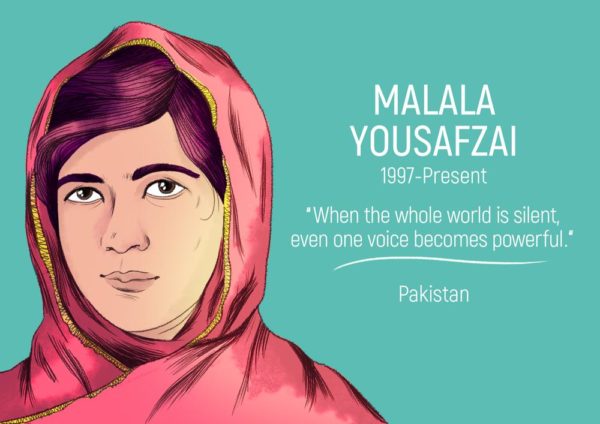
To commemorate International Women’s Day, the guys at Ampersand Travel, sent these images to us, and we had to share.
The illustrations are of iconic women who have left an indelible mark in the sands of time for – especially through the work they’ve done. Their achievements have been notable,and have impacted millions of women across the world.
Speaking about the inspiration for the project, Ampersand said:
“The inspiration for these illustrations was to celebrate iconic women not only from Ampersand destinations but from around the whole world. March is an important month for women with both Women’s History Month and International Women’s Day taking place. We wanted to do something extra special to celebrate the wonderful women who have had a significant impact on their own local communities and the world as a whole. It wasn’t easy to pick just 10 wonderful women but we looked to pick out iconic women from different countries throughout the course of history right up to the present day.”
See the illustrations below, along with the profiles of the women.
Emmeline Pankhurst – England
Women’s rights activist and leader of the British suffragette movement, which aided women to win the right to vote.
Women’s rights activist and leader of the British suffragette movement, which aided women to win the right to vote.
Emmeline Pankhurst was a staunch supporter of women’s rights, her biggest fight being the suffragette movement to win women the right to vote. Pankhurst was known for her radical and militant tactics, including window smashing, arson and hunger strikes.
Pankhurst first founded the Women’s Franchise League in 1889 which fought to allow married women to vote in local election. In 1903 she helped found the more militant Women’s Social and Political Union (WSPU) which was the first organisation to be referred to as ‘suffragettes’.
The group were notorious for their extreme campaigning which undoubtedly impacted upon winning women the right to vote. In 1918 women over 30 were given the right to vote. In 1928 Pankhurst died just weeks before women were given equal voting rights with men.
Physicist and chemist who conducted pioneering research into radioactivity, and was the first woman to win the Nobel Prize – and the only woman to win twice.
Marie Curie’s most famous achievement was the development of the theory of radioactivity, which has become a key part of medical advancements and research. Marie Curie remains to this day a key inspiration for women in STEM, a field in which women remain underrepresented.
Marie Curie was the first woman ever to be awarded with a Nobel prize in 1911 for her “services to the advancement of chemistry.” The Curie Institutes in Paris and Warsaw remain to this day major centres for medical research.
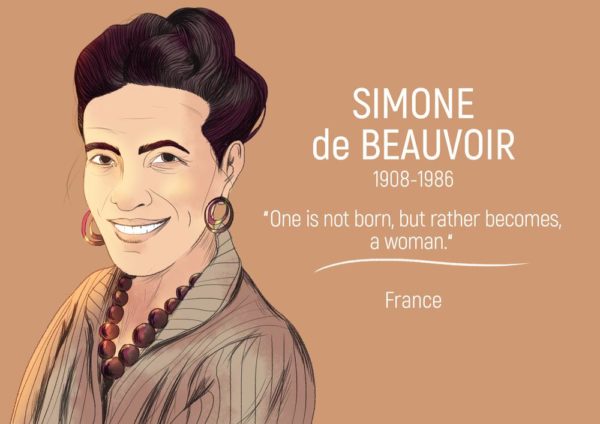 Simone de Beauvoir – France
Simone de Beauvoir – FranceWriter, political activist, social theorist and prominent feminist, best known for her book The Second Sex.
Simone de Beauvoir was an influential figure whose musings of feminism and existentialism has had significant impact on feminist movement and theory over history.
De Beauvoir’s most-famous work, The Second Sex is a detailed analysis of women’s oppression and is credited as the start of second-wave feminism. De Beauvoir has said that the text was a look at “why a woman’s situation, still, even today, prevents her from exploring the world’s basic problems.” De Beauvoir’s other notable works include her novels She Came to Stay and The Mandarins.
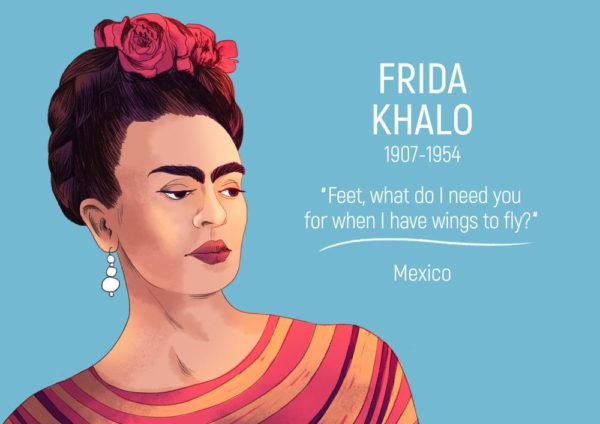 Frida Kahlo – Mexico
Frida Kahlo – MexicoPainter known for self-portraits which were an uncompromising exploration of the female form and experience.
Frida Kahlo has been heralded as a feminist icon and influence for her work and her depiction of women. Kahlo contracted polio aged six and suffered further trauma when she was in a bus accident in 1925 causing injuries to her leg and pelvis which left her infertile.
Kahlo’s work explores her suffering and self-image – including her experience of miscarriage – which was a diversion from the traditional depiction of female beauty in art.
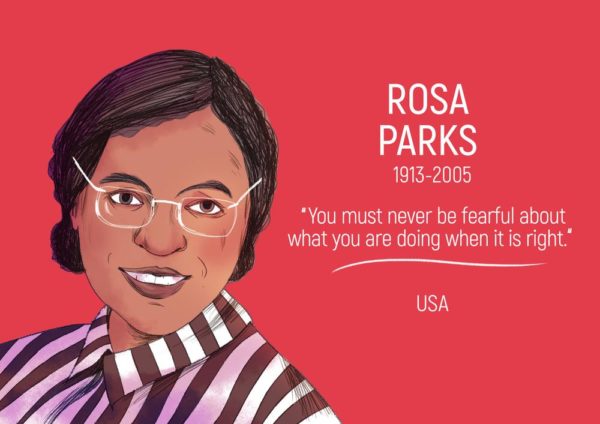 Rosa Parks – USA
Rosa Parks – USACivil rights activist who has been heralded as “the first lady of civil rights” and “the mother of the freedom movement.”
Rosa Parks became a notable figure for civil rights when in 1955 – a time at which racism was rife in her hometown of Alabama – she refused to give up her seat on the bus for a white passenger.
At the time the bus was segregated by race; when the ‘white section’ had filled up the bus driver instructed Rosa to give up her seat for a white passenger but she refused. The incident sparked the Montgomery Bus Boycott which lasted 381 days.
Parks went on to be an iconic player in civil rights activism working with notable leaders including Edgar Nixon and Martin Luther King, Jr. She has received many honours for her work including NACCP’s 1979 Spingarn Medal, the Presidential Medal of Freedom and the Congressional Gold Medal.
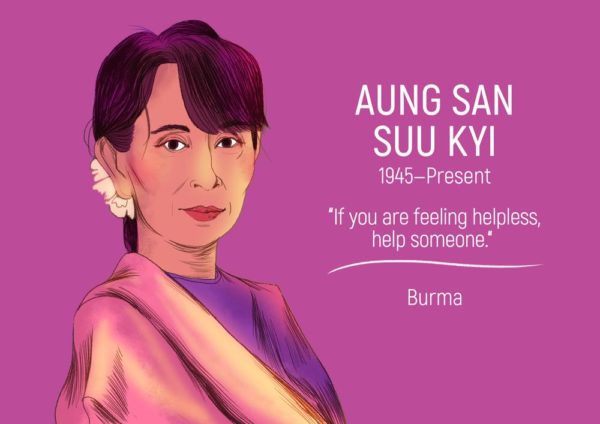 Aung San Suu Kyi – Burma
Aung San Suu Kyi – BurmaState Counsellor of Myanmar, Leader of the National League for Democracy, listed as one of Forbes’ 100 Most Powerful Women and a Nobel laureate.
Aung San Suu Kyi is the first ever woman to serve as the Minister of Foreign Affairs of Myanmar and is renowned worldwide for her political work, human rights activism and her attempts to bring democracy to Myanmar.
In 1990 Suu Kyi won the national elections, but the dictatorial Government at the time refused to hand over power and kept Suu Kyi under house arrest for fifteen years.
Since her release in 2010 she has continued to fight for democracy in Myanmar and in 2012 her party the National League for Democracy won 43 seats in the national by-elections. In 2015 she led her party to a majority win in Myanmar’s first openly contested election in 25 years.
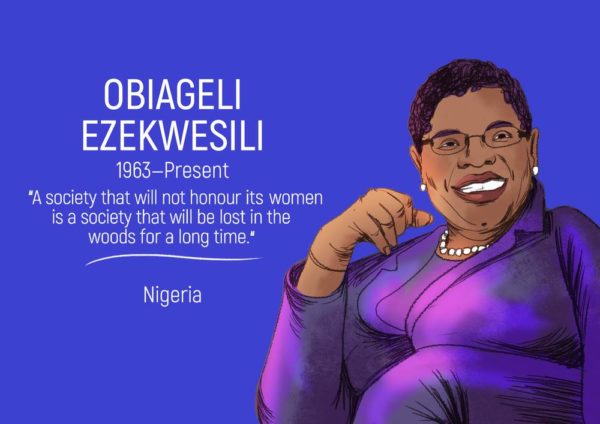 Obiageli Ezekwesili – Nigeria
Obiageli Ezekwesili – NigeriaCo-founder of the anti-corruption organization Transparency International and champion of the global #BringBackOurGirls campaign.
Obiageli Ezekwesili is known worldwide for her role in leading the #BringBackOurGirls campaign, however Ezekwesili was already a notable leading voice in Nigerian politics as co-founder of Transparency International, former Federal Minister of Education and Vice-President of the World Bank’s Africa division.
Ezekwesili has openly criticised the local government’s handling of the 200+ missing schoolgirls abducted by Boko Haram. Her #BringBackOurGirls campaign brought global attention to the issue in Chibok and trended worldwide with many powerful celebrities lending their support to the campaign.
Over 20 of the missing girls have since been found, Ezekwesili continues her campaign work to find the other missing girls and remains a notable voice in women and human rights.
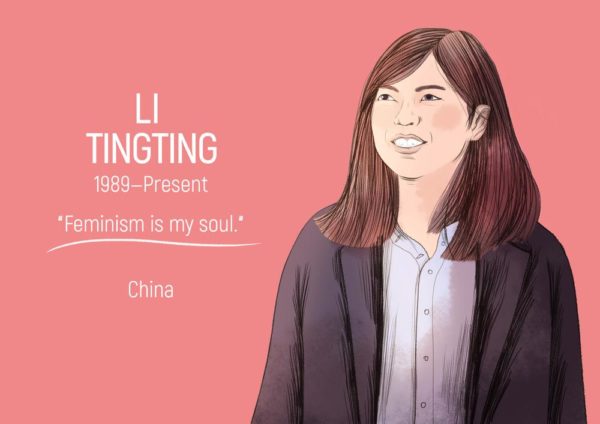 Li Tingting – China
Li Tingting – ChinaCampaigner and activist for gender and LGBTQ equality, known for her controversial public demonstrations.
Li Tingting has organised and participated in numerous high-profile campaigns in China to raise awareness of gender and LGBTQ inequality. In 2012 Tingting arranged a demonstration to raise awareness of domestic violence by wearing a blood-splattered wedding dress in the streets of China.
In 2015 Tingting and four other female activists, known as the ‘Feminist Five; were detained on the eve of International Women’s Day for their plans to protest against sexual harassment on public transport – which is all too prevalent in China. Their arrest sparked an international outcry and the women were released after 37 days.
Tingting is openly homosexual, in a country where LGBTQ discrimination remains rife. While same-sex marriage is not legal in China, Tingting held a wedding ceremony with her partner in 2015 and refuses to deny her sexuality. Tingting remains hopeful that same-sex marriage will become legal in China within her lifetime.
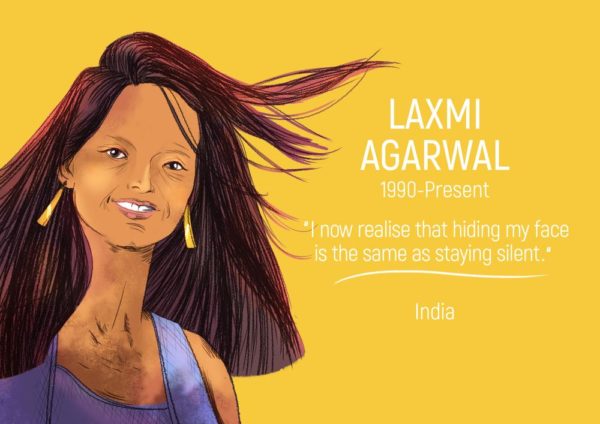 Laxmi Agarwal – India
Laxmi Agarwal – IndiaCampaigner who used her own experience as an acid attack victim to successfully regulate the sale of acid and make acid attacks easier to pursue in court.
Laxmi Agarwal was the victim of an acid attack – a crime which predominantly targets women in India – aged just 15, at the hands of an older man whose marriage proposal she had refused.
Deciding the attack wouldn’t ruin the rest of her life, Laxmi decided to use the experience to help other acid attack victims and launched a social media campaign called Stop Acid Attacks. Her petition to curb acid sales garnered 27,000 signatures and was successful in leading the supreme court to order that the sale of acid be regulated and acid attacks become easier to pursue in court.
Laxmi is now the director of Chhanv Foundation which is dedicated to helping the survivors of acid attacks in India, and in 2014 she received an International Women of Courage award from Michelle Obama.
 Malala Yousafzai – Pakistan
Malala Yousafzai – PakistanActivist for female rights and the youngest ever person to receive a Nobel Prize honour.
Malala advocates for women’s rights and education in her hometown in northwest Pakistan, where the Taliban has previously banned girls from attending school.
Malala’s fight for human rights rose to the forefront when aged 11-12 she wrote a blog for BBC Urdu – under a pseudonym – about her life under Taliban occupancy. Malala then became the subject of a New York Times documentary and began giving interviews about her experiences.
Malala survived an assassination attack by the Taliban in 2012 and has since moved to the UK. Her fight for human rights has become an international movement, having set up her own charity; co-authored a book; inspired an Oscar-nominated documentary and been awarded the first ever Pakistan National Youth Peace Prize; the 2013 Sakharov Prize, and the 2014 Nobel Peace Prize.
Source: BellaNaija
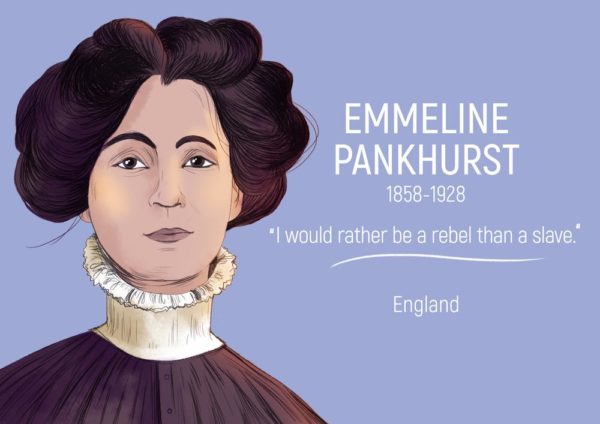
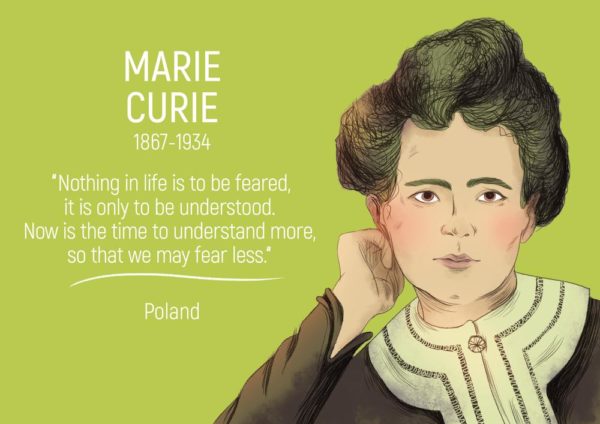
No comments:
Post a Comment
We appreciate YOU reading this, please Leave a comment!